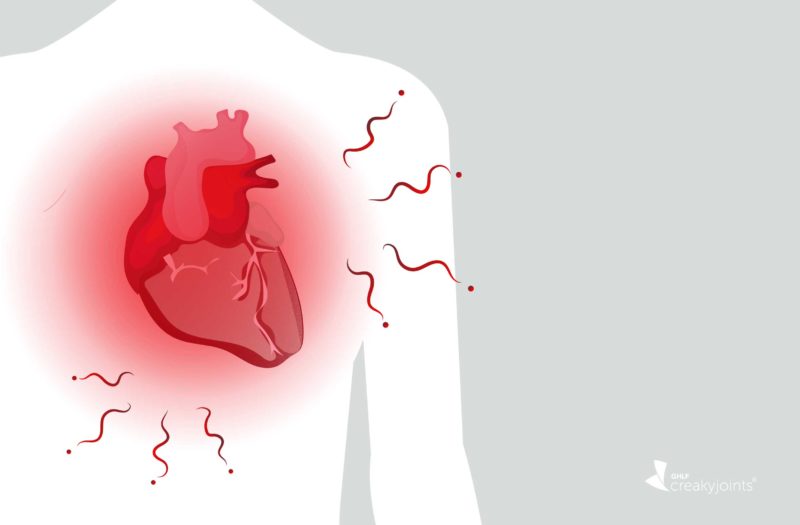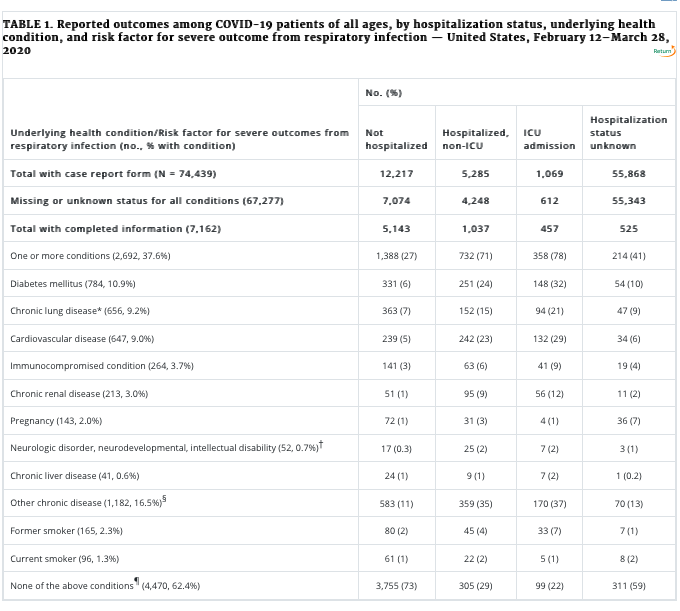Learn more about our FREE COVID-19 Patient Support Program for chronic illness patients and their loved ones.
What chronic health conditions place you at a higher risk for having COVID-19 complications, including those that require hospitalization and treatment in the intensive care unit (ICU)? While the U.S. Centers for Disease Control and Prevention (CDC) has listed some high-risk conditions on its website for weeks, the specifics have been vague, or based on data from such other countries as China and Italy as well as general knowledge about people at risk for respiratory health issues.
Now researchers have a more detailed picture of which types of underlying health issues are most closely tied to worse COVID-19 outcomes, thanks to an initial analysis of COVID-19 cases reported to the CDC as of March, 2020 and published in this week’s Morbidity and Mortality Weekly Report.
The main takeaway: Most people who required hospitalization or ICU admission had at least one underlying health condition or risk factor for COVID-19 complications. Seventy-eight percent of people who required ICU admission had at least one chronic illness as did 71 percent of people who were hospitalized but did not need ICU admission.
These data are based on 7,162 COVID-19 cases for which the presence or absence of underlying health conditions and other recognized risk factors for severe outcomes from respiratory infections (i.e., smoking and pregnancy) were available.
According to the report, public health departments reported cases to CDC using a standardized case report form that captured information on the following conditions and potential risk factors:
- Chronic lung disease (including asthma, chronic obstructive pulmonary disease [COPD], and emphysema)
- Diabetes mellitus
- Cardiovascular disease
- Chronic kidney disease
- Chronic liver disease
- Immunocompromised condition
- Neurologic disorder, neurodevelopmental, or intellectual disability
- Pregnancy
- Current smoking status
- Former smoking status
- Other chronic disease
The Most High-Risk Chronic Illnesses for COVID-19
The most common conditions associated with coronavirus hospitalization and ICU admission were diabetes mellitus, chronic lung disease, and cardiovascular disease. According to the data:
- 32% of COVID-19 patients with diabetes required ICU admission; 24% required hospitalization without ICU admission
- 21% of COVID-19 patients with chronic lung disease required ICU admission; 15% required hospitalization without ICU admission
- 29% of COVID-19 patients with cardiovascular disease required ICU admission; 23% required hospitalization without ICU admission
You can see the chart below for more details on hospitalization rates by condition reported.
What These Data Mean for #HighRiskCovid19 Patients
According to the CDC report’s authors, “these results are consistent with findings from China and Italy, which suggest that patients with underlying health conditions and risk factors, including, but not limited to, diabetes mellitus, hypertension, COPD, coronary artery disease, cerebrovascular disease, chronic renal disease, and smoking, might be at higher risk for severe disease or death from COVID-19.”
However, the authors note that “this analysis was limited by small numbers and missing data because of the burden placed on reporting health departments with rapidly rising case counts, and these findings might change as additional data become available.”
Also important: “It is not yet known whether the severity or level of control of underlying health conditions affects the risk for severe disease associated with COVID-19,” the authors wrote. In other words, there is not enough data to say that someone who has well-controlled COPD, for example, has a lower risk of coronavirus complications than someone whose condition is not well-controlled.
Conditions that were not specifically listed in the report need more study. The authors note that “no conclusions could be drawn about underlying conditions that were not included in the case report form or about different conditions that were reported in a single, umbrella category.”
Updates for Inflammatory Arthritis and Other Related Conditions
Specifically, inflammatory conditions that are associated with being immunocompromised such as rheumatoid arthritis, psoriatic arthritis, lupus, and inflammatory bowel disease (IBD) need more data in order to understand whether people with them are hospitalized from COVID-19 at higher rates than the general population. Thankfully, researchers are starting to collect and analyze this data through the development of disease-specific research registries, such as Secure-IBD and COVID-19 Global Rheumatology Alliance.
Initial data from the rheumatology registry is starting to be analyzed and some initial results (on about 50 cases) were shared via Twitter earlier this week. Most patients in the database have rheumatoid arthritis (38 percent), lupus (17 percent), and psoriatic arthritis (11 percent). Three-quarters of all patients were in low disease activity or remission at the time of COVID-19 infection.
The most commonly used medications at the time of infection were methotrexate (29 percent), TNF inhibitor biologics (25 percent), and hydroxychloroquine (19 percent). Most patients were not currently on glucocorticoids, which are known to be immunosuppressing. Presently, all of the patients are alive and 28 percent have resolved symptoms. Most (58 percent) received no treatment for COVID-19 except supportive care.
Advice for High-Risk Patients from the CDC
People with underlying health conditions who have symptoms of COVID-19, including fever, cough, or shortness of breath, should immediately contact their health care provider.
They should take steps to protect themselves from COVID-19 through:
- Washing their hands
- Cleaning and disinfecting high-touch surfaces
- Social distancing, including staying at home, avoiding crowds, gatherings, and travel, and avoiding contact with persons who are ill
- Maintaining at least a 30-day supply of medication, a 2-week supply of food and other necessities
- Knowledge of COVID-19 symptoms are recommended for those with underlying health conditions
Get Free Coronavirus Support for Chronic Illness Patients
Join the Global Healthy Living Foundation’s free COVID-19 Support Program for chronic illness patients and their families. We will be providing updated information, community support, and other resources tailored specifically to your health and safety. Join now.
CDC COVID-19 Response Team. Preliminary Estimates of the Prevalence of Selected Underlying Health Conditions Among Patients with Coronavirus Disease 2019 — United States, February 12-March 28, 2020. Morbidity and Mortality Weekly Report (MMWR). March 31, 2020. doi: http://dx.doi.org/10.15585/mmwr.mm6913e2.







